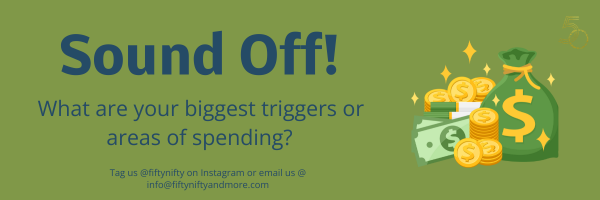
Listen. You’re a reasonable woman. You’ve made it this far in life in one piece, so you must be doing something right, right? But many of us experience the NSF, the bounced checks, the “suddenly” maxed-out plastic (truthfully, it usually happens over time), and the pricey service charges that banks apply when you’ve overdrawn.
We can all justify our actions when convenient. Do you use any of these classic cop-outs?
- “Oh, but it’s a gift (for so-and-so).”
- “Oh, but it was on sale, marked down twice, and it’s a great value!”
- “Oh, but I have to look good (for work, college reunion, etc.).”

Signs that your recreational spending may be off the hook:
- You have too much stuff.
- You have duplicates or near-duplicates of many things (identical appliances, garments).
- You spend a lot of time returning and exchanging recent purchases.
- Sometimes you look at a recent purchase and wonder “Why did I buy this?”
- Your debit or credit card has recently been declined…
- …and it’s not the first time.
Hey lady, it’s your money, and you get to do what you want with it. But overspending can ding your credit rating and leave you without that reassuring cushion of emergency funds that one should always keep for ill winds and stormy weather. You should never be surprised by the bottom line in your accounts or in your purse. If you’re frequently shocked by a shortage of shekels, you may be spending unconsciously. This is a lot like unconscious snacking. One minute you’re doing fine with your greens and lean proteins, and the next minute there’s an empty pint-container of Ben and Jerry’s Cherry Garcia in your hand. How did that happen?

Spending money, like eating, always carries with it an emotional component. It often feels good and can be a lot of fun. But if you regret it the morning after, check out these common triggers for overindulging and ask yourself if you want to make a change in your habits.
- Boredom
Let’s face it: life can get pretty darn dull if you’re not actively engaged in something you love. People in midlife may find themselves without the stimulation they’re accustomed to getting. Retirement and empty nesting are common causes. If this rings true for you, do a soul-search and find something that inspires your attention, from kickboxing to quilting.
- Anger
When things don’t go your way, do you reach for your credit card? This is the fiscal equivalent of reaching for a cupcake, a cocktail, or a cigarette. It’s easy to justify. You’re a grown woman, and you deserve to gratify yourself. No argument there. But if the purchases (or calories) are piling up in ways you don’t like, you might want to take a look at how you’re feeding your anger.
- Stress
When we feel challenged or threatened, the sympathetic nervous system triggers the release of a hormone called cortisol. Cortisol is casually termed the fight-or-flight brain chemical, and it is indeed lifesaving in an emergency (i.e., your house is on fire!). But modern people live with elevated cortisol 24/7, and this elevation is especially present due to generational trauma. When you feel your blood pressure and heart-rate spike, do you break the tension by heading for the mall or going online and snapping up bargains?
- Fear
This raw and primal emotion has many sources, and it often feels like scarcity (“not-enough-ness”) and abandonment. Locating the origin of these feelings may be difficult. If you spend or binge in other ways compulsively, meaning in a kind of automatic way without thinking about it, you may be unconsciously attempting to soothe deeply rooted fear. Fear can manifest in panic-spending, with a possible trigger being a fear of losing your income or funds.
- Loneliness
Just as French fries can feel like friendship, shiny new stuff can make your life feel full for a minute. Inanimate things can give us comfort and pleasure, but in the long run they are no substitute for human company, or even the presence of other living things (plants, gardens, pets). Have you considered taking an in-person class, or volunteering, to soften feelings of isolation?
- Excitement
This type of spending is especially tempting. Maybe you know the expression “What happens in Vegas stays in Vegas”? This captures the essence of excitement-spending which often happens when we’re travelling, on vacation, or at a special event. We get it. We get giddy! Who can resist a great souvenir or memento?
- Peer Pressure
What human beings want most of all is to love and be loved, and this is the connective tissue of social relationships. These bonds may sometimes take on a competitive quality, and sometimes we may find ourselves showing off. If our friends love going out to ritzy clubs and buying designer goods, it’s natural to want to take part.

Coping and Cash
Now, don’t get the wrong impression. Some people really enjoy austerity, the mindset of make it do, make it last, wear it out. This thriftiness is admirable. Others of us are more lavish in nature, spending generously, and this can be joyful. It’s all a matter of staying within your means and avoiding debt.
If you’re being scolded by loved ones about your spending habits, ask yourself if they have a point. If you decide that you’d like to manage your recreational spending differently than you do today, here are our top 4 tips:
- DELAY PURCHASES. Just as nutrition and weight loss experts advise that we not go food shopping when we’re hungry, apply this reasoning to other kinds of shopping. If you’re emotionally worked up about something, don’t buy anything that day. Unless it’s cat litter or your daily bread, it can wait 24 hours. Do something else that’s satisfying: go for a hard workout, crank up your favorite tunes and sing at the top of your lungs, or change the sheets on your bed and take a bubble-bath. (We recommend all three.)
- BUDGET FOR SELF-CARE. Yes, you do deserve nice things. Yes, you do deserve to enjoy yourself. But take a minute to prioritize your spending. In the heat of the moment, if you’re feeling anxious or a million other things, you may buy a new handbag. Now, we love our handbags, purses, pocketbooks, wallets. There is no more literal signifier of wealth! But does that purchase really do it for you? Consider keeping some dollars to the side for regular massages, pedicures, aromatherapy or hot-stone treatments — or simply for a bunch of fresh flowers every week.
- GIVE YOURSELF AN ALLOWANCE. Seriously. When you know that you’ll be in a potentially triggering setting — art show, blues festival, your favorite shop or eatery, fabulous vacation destination — count out some cash and spend every penny without regret. By confronting the fact that you’ll probably heed the call of the wild, and designating a specific amount, you’re taking responsibility for the spend. Dealing in cash is also a reality-check, although these days some establishments no longer accept hard currency!
- CREATE A NO-SPEND SWAP. Women in mid-life and beyond have stuff. It’s inevitable, and it’s not a bad thing. But being human, we are innately curious and we crave novelty. How about organizing a monthly “free swap”? Each month, get together with your core crew, and encourage them to invite others to join. One afternoon or evening, everyone converges at someone’s home with one or more items they’re willing to release. Set a dollar-value if you want to, though this may not be necessary. You may be more than happy to let go of your ex-mother-in-law’s china teapot. It’s lovely, but…and your bestie may have a fly pink leather jacket that’s too big now that she’s sized down. Whatever! This swap accomplishes a few things at once. First, it removes some clutter from your closet. Second, it gives you that little spark of newness that is always so much fun. And third, it creates an opportunity for some fellowship and laughs. If the party closes with unclaimed treasures still on the table, donate these to the nearest shelter or charity.

Be the first to comment